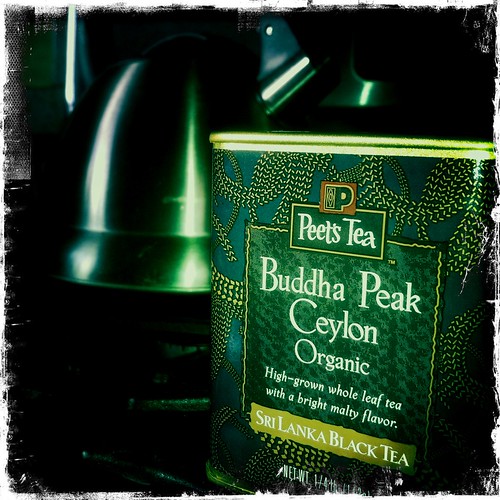 Greetings, coffee (and tea) enthusiasts, and welcome to yet another edition of Drew's Reviews—the only coffee (and tea) review fully endorsed by both Hootie and the Blowfish!
Greetings, coffee (and tea) enthusiasts, and welcome to yet another edition of Drew's Reviews—the only coffee (and tea) review fully endorsed by both Hootie and the Blowfish!This edition is a little different than usual for two reasons: 1) we're only going to be reviewing one beverage, and 2) it's not coffee! Today, we're taking a look at Peet's Coffee and Tea's newest black tea, Buddha Peak Ceylon Organic tea. Now, bear with me, because, despite my Irish blood, I've never been much of a tea connoisseur—I'm more of a coffee lover. Not only does this make me a bit of a black sheep in my family, but it also offsets me with a company that focuses just as much attention on their teas as they do their coffees. So in an effort to keep all of you informed of Peet's latest and greatest offerings, I'm also making a special effort to branch out and stay informed. Hopefully, by the end of this review, we'll both have learned something.
Last week, Peet's rolled out its brand new Buddha Peak Ceylon Tea Organic tea, a blended tea that is named after its place of origin—in Dimbula, Sri Lanka, near the holy mountain peaks of Sri Pada. Peet's has a longstanding history of sourcing tea from Sri Lanka, selling it as a single origin leaf and also incorporating it into other blends—most recently, it made an appearance in our Winter Solstice tea. With a combination of growing altitudes of up to 6,000 feet and traditional leaf-rolling methods, Sri Lankan teas are typically noted for their brisk, tangy, bold flavors, rich aromas, and good pungency. These characteristics make for outstanding single origin leaves, but also add unique elements to blended teas.
Not only is Sri Pada a rewarding pilgrimage for Eliot Jordan, Peet's Tea Buyer, it is also considered a holy mountain by Buddhists who, year after year, make pilgrimages there. At the very peak of the mountain, there is a shrine to Samanta, a figure that the Theravada Buddhists of Sri Lanka have designated the guardian of their land and their religion.
There are four basic elements to Buddhism, known as the Four Noble Truths—the truth of suffering, the truth of the cause of suffering, the truth of the end of suffering, and the truth of the path that leads to the end of suffering. Coincidentally, there are also four basic elements to tea tasting—flavor, aroma, mouthfeel, and finish. Now, if you've been following Drew's Reviews the past few weeks, you probably know well by now that I'm just the type of corny guy that will find a loose connection and write an entire review based on that weak affiliation.
This review is no different.
Buddha Peak Ceylon Organic tea has a soothing, flavorful aroma with notes of citrus that become even more evident upon first sip, and hints of a rich smokiness that give it a full body. The taste is even more rewarding—it has a light maltiness that barely coats the palate, but is still heavy enough to make for a bold, full flavor. The citrus notes, which are present in the tea's aroma, become even more dominant and provide a brisk tanginess. I also tried the tea with a little bit of half and half and, oddly enough, it didn't compromise the citrus notes in the least. In fact, the citrus shone through the cream and made the tea taste a bit like a dreamsicle—a flavor any child that was a product the 1980's can appreciate. Buddha Peak also has a crisp, clean finish that doesn't linger very long and a minimal astringency unlike a lot of other black teas (i.e., Earl Grey).
If you're anything like me (an Irishman whose only experience with tea is Irish and English Breakfast and Earl Grey), this is a fantastic tea to start branching out with. It's not wildly different from other black teas, but is unique enough to provide you with an interesting taste experience you're not accustomed to. For avid tea enthusiasts, Buddha Peak Ceylon Organic is a wonderful tea to discover, and it is this writer's prediction that it will probably become one of your new favorites—particularly when had with breakfast or lunch.
No comments:
Post a Comment